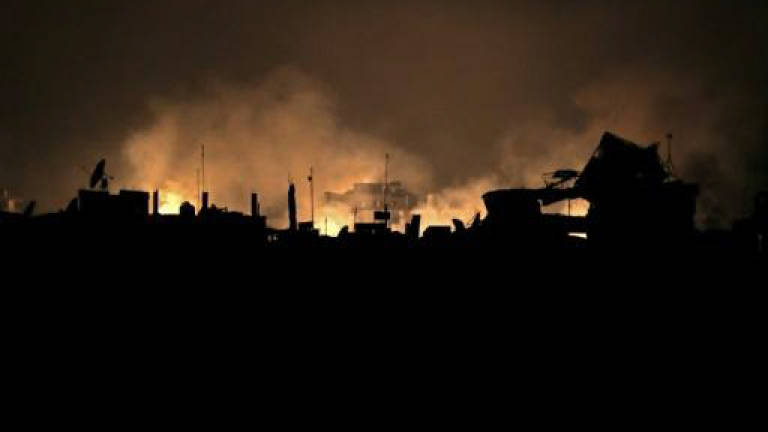Rebels cornered as Syria and Russia pummel Ghouta

HARASTA, Syria: The Syrian regime sought to seal its reconquest of Eastern Ghouta Friday as rebels evacuated a pocket close to Damascus and others were forced into talks by relentless bombardment.
The enclave's six-year rebel rule looked to be in its dying days as Damascus and its ally Moscow implemented a 'leave or die' strategy with deadly air strikes.
AFP reporters saw incendiary munitions fall on one of Ghouta's two remaining rebel-held pockets. The Syrian Observatory for Human Rights said Russian aircraft also fired them on the other.
The first batch of fighters to quit Ghouta under a Russian-brokered deal were bused out on Thursday and started arriving in the northwestern province of Idlib on Friday.
An AFP reporter in the province, the last still largely outside government control, saw the first buses arrive at a camp after spending the night on the edge of rebel-held territory.
Around 400 fighters from the Islamist group Ahrar al-Sham and hundreds of their relatives were bused out of Harasta on Thursday, a modus operandi the regime has used several times in the seven-year-old conflict.
"Our situation in Harasta was very tragic," said Mohammed Madani, a civilian who arrived at a camp for the evacuees in the town of Maarat al-Ikhwan.
"We couldn't live above ground because of the heavy bombardment... Some children stayed in basements for four months with no food. We couldn't even find fodder to eat," he said.
Fresh evacuations
Another batch of evacuations from Harasta began on Friday but it remained unclear how much time would be needed to bus out the thousands of remaining rebels and civilians.
Harasta was one of three pockets formed when the offensive by regime and allied forces splintered the rebel enclave earlier this month.
Retaking Eastern Ghouta, a sprawling semi-rural area which had escaped government control since 2012 and lies within mortar range of central Damascus, was made a priority by the regime this year.
The evacuation of Harasta came as part of a deal negotiated by Russia, which has played a key role in the deadly offensive launched against the enclave on Feb 18.
Each one of the three pockets has come under intense bombardment, essentially forcing the rebel factions that control them to sue for an evacuation.
The Ahrar al-Sham, whose fighters were being evacuated from Harasta had made some demands in the talks but were pummelled into accepting whatever conditions were imposed to them.
"The one thing they got was that they were able to leave without being killed," said Nawar Oliver, an analyst at the Turkey-based Omran Centre.
Ceasefire
A similar scenario appeared to be shaping up in the other two pockets, which have shrunk significantly and were targeted by incendiary munitions in recent days, AFP reporters said.
The Observatory said incendiary munitions were used in Russian strikes on Arbin, a town in enclave's southern pocket.
At least 37 civilians were killed in the strikes late Thursday, said Rami Abdel Rahman, the head of the monitoring organisation, that relies on a wide network of sources on the ground.
Another 38 were killed in other bombardment on the same pocket on Thursday.
That pocket is controlled by Faylaq al-Rahman, an Islamist group that announced shortly afterwards it was agreeing to a ceasefire.
The truce will permit "a final round of negotiations" between rebels and Russia, a spokesman for the group said.
"The humanitarian situation continues to be catastrophic, with no food, emergency items nor medical supplies and outbreaks of disease due to civilians stuck in crowded and insalubrious basements," Wael Alwan told AFP.
Scabies
"There are cases of lice and scabies," the Turkey-based spokesman told AFP.
AFP video and pictures from the enclave's largest town Douma, which is controlled by a third rebel faction, Jaish al-Islam, showed bright white streams falling from the sky in a fashion consistent with incendiary munitions.
Jaish al-Islam too opened negotiations with Russia.
Those negotiations could lead to a different type of deal whereby rebels get to stay as part of local policing force once the regime takes over, the Observatory chief said.
The offensive on Eastern Ghouta has caused widespread outrage and marked one of the darkest episodes of a war that entered its eighth year this month.
According to the Observatory, more than 1,600 civilians have been killed in just over a month.
"Those who support the regime in carrying out these atrocities and vile murders have lost their moral compass entirely," British Foreign Secretary Boris Johnson said in a statement. — AFP